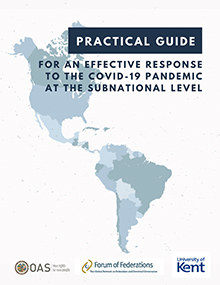Bibliothèque

Language:
EnglishTopic:
Covid, Pandemic, SubnationalCollection:
Guides d'Apprentissage / Ouvrages d'Initiation
In July 2020, the Organization of American States, the Forum of Federations and the University of Kent signed a Memorandum of Understanding to support the OAS Department for the Promotion of Peace and for the Coordination with Subnational Governments in its peace building, conflict prevention, crisis management and conflict resolution efforts. The first joint initiative launched by these three partners was a webinar on the occasion of the International Day of Peace (September 21) addressing the growing pivotal role of subnational governments in the current Latin American and Caribbean COVID-19 scenario. The event aimed to:
- Develop a better understanding of the differentiated impact of the crisis across countries, regions and municipalities;
- Highlight the key challenges facing subnational governments as a result of the pandemic, as well as good practice examples in addressing those challenges;
- Call attention to the need to raise the voice and increase the participation of subnational governments in the hemispheric dialogue;
- Examine the new priorities societies face in the COVID-19 era, including the need for greater coordination between national and subnational governments to address the impacts of the pandemic;
- Identify next steps to chart a new era of cooperation with these influential actors by learning from other successful collaborative experiences from the region and beyond; and
- Explore the opportunities that the pandemic offers to rebuild more just and peaceful societies as governments transition from response efforts to the recovery phase of the crisis.
The invaluable information, rich exchanges and vast amount of data provided by the experts and practitioners who participated in the event provided meaningful insights and recommendations. These have been reviewed and summarized to produce this practical guide as an important contribution to the hemispheric efforts underway to strengthen local democratic governance, and more specifically to respond effectively to the COVID-19 pandemic at the subnational levels.

